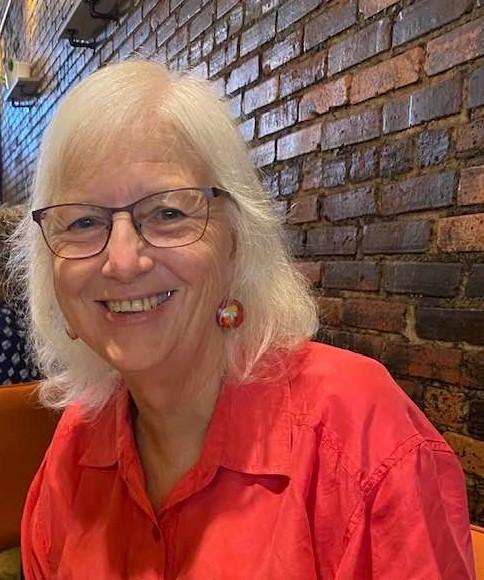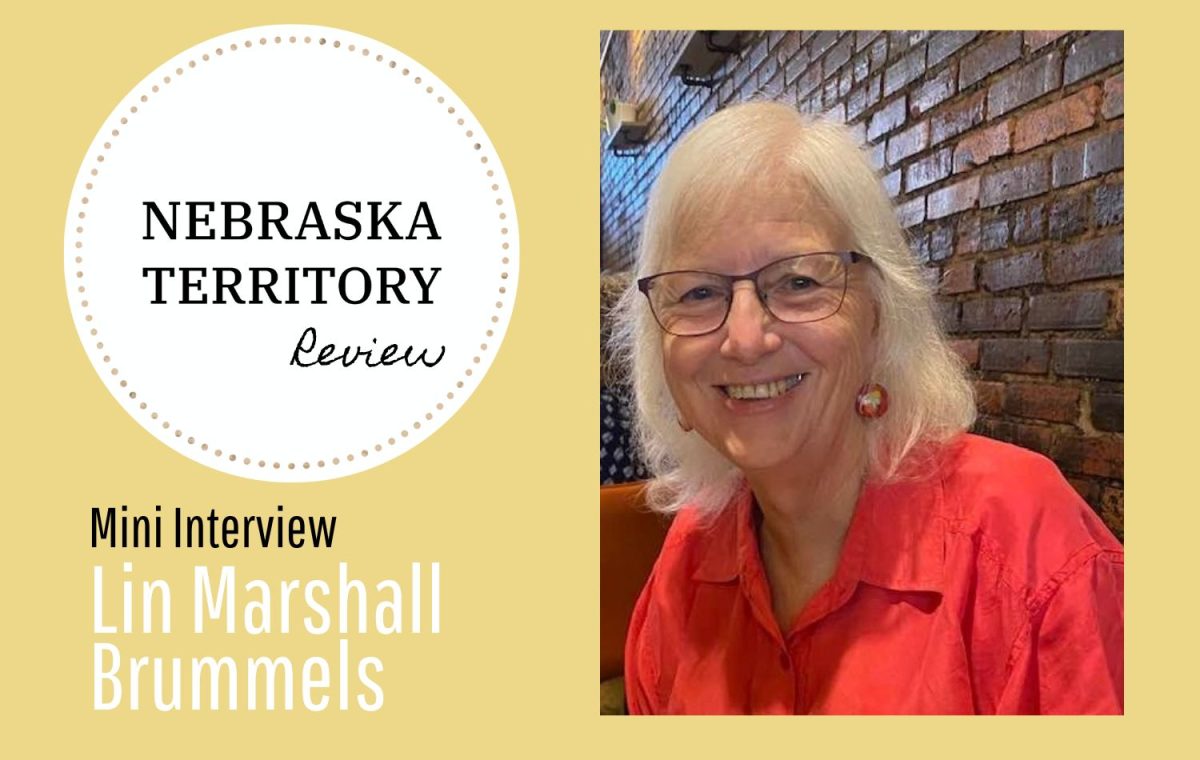How did you get into writing? Do you remember your first piece of writing?
I was a WSC counselor for many years, and most of those years were as Director of the Wayne State College (WSC) Counseling Center (1988 – 2018). In that position and previous mental health jobs, I wrote multiple academic reports. During those same years, I was fortunate to attend readings hosted at WSC and listened to multiple writers, e.g., Bill Kloefkorn, Ted Kooser, Linda Hasselstrom, Paul Zarzyski, and too many more talented people to name. I admire poets’ ability to say much with few words and made the transition to creative writing in my fifties.
- First piece of writing: I penned a report about the Vietnam War in high school for a combined History/English assignment. I remember this especially because the History teacher failed my paper because he disagreed with the arguments in the paper. The English teacher awarded the paper an A for the way the paper was written. This contrast fueled my desire for fairness in writing and education. It was also a lesson about politics in any piece of writing. Amanda Gordon’s poem at the Biden Presidential inauguration ignited my interest in her work. She said in a 2022 TED talk, Using your voice is a political choice.
- I discovered The Golden Notebook by Doris Lessing in graduate school. This book has had a profound influence on my life. The author introduced me to the idea of writing about the events and ideas that can change life’s direction in separate notebooks, then attempting to interweave those threads in a final or golden notebook. I’m the person who often has a “one-track” approach to education, projects, or relationships. It was enlightening to consider multiple directions. One moment I might write about the natural world, then the lives of horses, managing grief, or working with mental health issues. My eventual goal is a memoir, a golden notebook of my own.
How do you think you’ve evolved creatively?
My early poems often sounded like academic reports. To improve, I have taken workshops, online classes, and joined a writing group of incredibly helpful and patient people. Workshopping poems continues to teach me to see my poems as a reader might. Revision is my friend. In my recent work I am leaning toward lyric story poems, with the guiding principle that poetry should be accessible.
You were recently published in the inaugural issue of The Gilded Weathervane. How does living in the Plains give you inspiration for writing?
I am so honored to be included in the inaugural issue of The Gilded Weathervane. Dr. Stephanie Marcellus and Angela Sievers created a beautiful journal. I am an outdoorsy person. I like to spend time outside walking, gardening, and choring every day. I grew up on an old-style farm where my folks did a bit of everything. The place was located southwest of Clearwater, NE. In those days, Clearwater posted a sign outside town that read something to the effect that in Clearwater a person could witness the East petering out and the Sandhills beginning. I miss that sign, long gone. My folks raised pigs, chickens, dairy cows, and had a huge garden. One of my chores was herding cows down the road in summer to give the pasture a rest and the cows a chance to graze lush ditch brome. Whenever possible I would take a book with me and read while the cows munched. I do not milk cows today, thankfully. I garden and board horses to honor my farm and ranch roots.
What writers inspire you the most?
I admire Linda Hasselstrom’s poems and essays about life in western South Dakota. I attended two writer’s retreats at her retreat house near Hermosa, South Dakota. She is a wonderful teacher. I appreciate Neil Harrison’s ability to write poetry and songs that succinctly capture issues. I have learned a lot from Barbara Schmitz’s positive attitude and how to capture positivity in poetry. I study Ted Kooser’s ability to describe a detail. His focus and descriptions are enlightening. Recently I read South Dakota Poet Laureate Bruce Rosemond’s latest book, Earl’s Own Dakota Odyssey, after hearing him read from the book. He has a wonderful ability to make words flow. I am constantly amazed by current and past Nebraska State Poets and learn from all of them. Bill Kloefkorn had a lovely reading voice which gave life to his numerous poems. Twyla Hansen can see and capture nature’s beauty in her poetry. Matt Mason writes insightful, humorous poems and I admire his energy to get to all Nebraska’s counties.
Do you have a writing routine or any methods that you use?
When I worked full-time, I got up at 5:30 am and wrote for an hour before work. Now semi-retired, I work part-time at my private mental health practice, Pearl Street Counseling, LLC. My time is more flexible, but I continue to write early mornings and watch the sun come up. My day starts later now. Early now means first thing after the coffee is ready and pets are fed.
What inspires your writing?
I find inspiration from family, animals in my care, mental health issues, seasons in the garden, and current events. I take advantage of prompts when I can.
What is the hardest thing about writing, and how do you work through it?
Starting to write later in life, it is as if there is a backlog of words in my head demanding a place on the page and I must write them down. Revising to eliminate redundancies, inaccuracies, or downright awful lines is harder. To quote William Faulkner, “In writing, you must kill all your darlings.” To work through revisions, it is best to let a poem sit for a while. Time illuminates glaring lines and/or words that do not belong. Workshopping poems with writing group friends is a helpful means for me to notice other errors. Without an English major’s background, I often struggle with grammar issues.
Are you working on anything currently?
I have a manuscript of mental health-related poems, Coping Skills: Poems from a Therapist. It is out making the rounds of contests and publishers. I am optimistic about finding a home for this book of poems. It addresses how I became a counselor and highlights a composite of mental health issues during my years of working in higher education with students and with adults in my private practice. I am also working on a poetry manuscript about the horses our family has owned and loved. Another idea I am pursuing is a collection of poems quoting from or borrowing the first lines of poems from the book to kindle ideas for my poems. That book is Graining the Mare, Poetry of Ranch Women, edited by Teresa Jordan.
What advice would you give to aspiring writers?
The advice I received was to read, read, and read some more. I have found this to be immensely helpful. I attend as many author readings as I can and buy their books. I read other poets’ works. In my book club, we read novels and memoirs. My advice to aspiring writers is to read both in your interest area and outside it. If you want to write short stories, read short stories, but also read poetry, memoirs, novels, etc.
Is there anything else you would like to add?
I have participated as a judge in regional high school students’ Poetry Out Loud competitions for several years, first in person and, since the pandemic, judging students’ videos of themselves reciting. I have also helped judge journals’ poetry contests and am reading entries for one contest now.
 Lin Marshall Brummels grew up on a dairy farm and honors those country roots boarding horses. She earned a BS from the University of Nebraska and an MS from Syracuse University. She is a Nebraska-licensed mental health counselor. Her poem “Jerry’s Hands” was an Honorable Mention poem in the 2021 Nebraska Poetry Society’s contest. Brummels has published poems in Poet Lore, San Pedro River Review, Concho River Review, Oakwood, Plainsong, Nebraska Life, and others. Her chapbooks by Finishing Line Press are “Cottonwood Strong” and “Hard Times,” a 2016 Nebraska Book Award winner. Books: “A Quilted Landscape,” Scurfpea Publishing. Forthcoming, The Last Yellow Rose, Sandhills Press.
Lin Marshall Brummels grew up on a dairy farm and honors those country roots boarding horses. She earned a BS from the University of Nebraska and an MS from Syracuse University. She is a Nebraska-licensed mental health counselor. Her poem “Jerry’s Hands” was an Honorable Mention poem in the 2021 Nebraska Poetry Society’s contest. Brummels has published poems in Poet Lore, San Pedro River Review, Concho River Review, Oakwood, Plainsong, Nebraska Life, and others. Her chapbooks by Finishing Line Press are “Cottonwood Strong” and “Hard Times,” a 2016 Nebraska Book Award winner. Books: “A Quilted Landscape,” Scurfpea Publishing. Forthcoming, The Last Yellow Rose, Sandhills Press.



